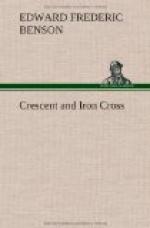Here, then, we see defined and at work the new Ottoman policy with regard to its peoples. Hitherto, it had been sufficient to take from them its fill of man-power, and leave the tribe in question to its own devices. There was no objection whatever to its developing the resources of its territory, to its increasing in prosperity and in population. Indeed the central Power was quite pleased that it should do so, for when next the gathering of taxes and youths came round the collectors would find a creditable harvest awaiting them. Such a tribe received no encouragement or help from the Government; that would have been too much to expect, but as long as it kept quiet and obedient it might, without interference, prosper as well as it could. But now, in the last quarter of the nineteenth century, all that was changed; instead of a policy of neglect there was substituted a policy of murder. The state no longer considered itself secure when in various parts of its dominions its subjects showed themselves progressive and industrious. They had to be kept down, and clearly the most efficient way of keeping people down was killing them. Let it not be supposed for a moment that either the first massacre, or any that followed, was the result of local disturbances and fanaticism. It was nothing of the sort: each was arranged and planned at Constantinople, as the official means, invented by the arch-butcher, Abdul Hamid, of maintaining in power the most devilish despotism that has ever disgraced the world. Something had to be done to prevent the alien tribes in Asia slipping out of the noose of Ottoman strangulation, even as the European tribes had done, and forming themselves into separate and independent states. A ruler with progressive ideas, one who had any perception of the internal prosperity which alone can render an empire stable, would have made the attempt to weld his loose and wavering domination together by encouraging and working for the prosperity of its component peoples, so that he might, though late in the day, give birth to a Turkey that was strong, because its citizens were prosperous and content. Not so did Abdul Hamid; the Turkey that he sought to establish was merely to be strong because he had battered into a blood-stained pulp the most progressive and the most industrious of the alien peoples over whom he ruled.
It is significant that, while yet the blood of the murdered Christians was scarcely washed from the streets of Constantinople, the Emperor Wilhelm II. visited his brother-sovereign at Yildiz, after making his tour throughout the Holy Land. The two can hardly, in their intimate conversations, have completely avoided the subject of the massacres; but after all, that was not such an unmanageably awkward topic, for Wilhelm II. could tactfully have reminded Abdul Hamid that his own throne also was based on the murderous progress of the Teutonic Knights. Then there was the war between Turkey and Greece only lately concluded to




